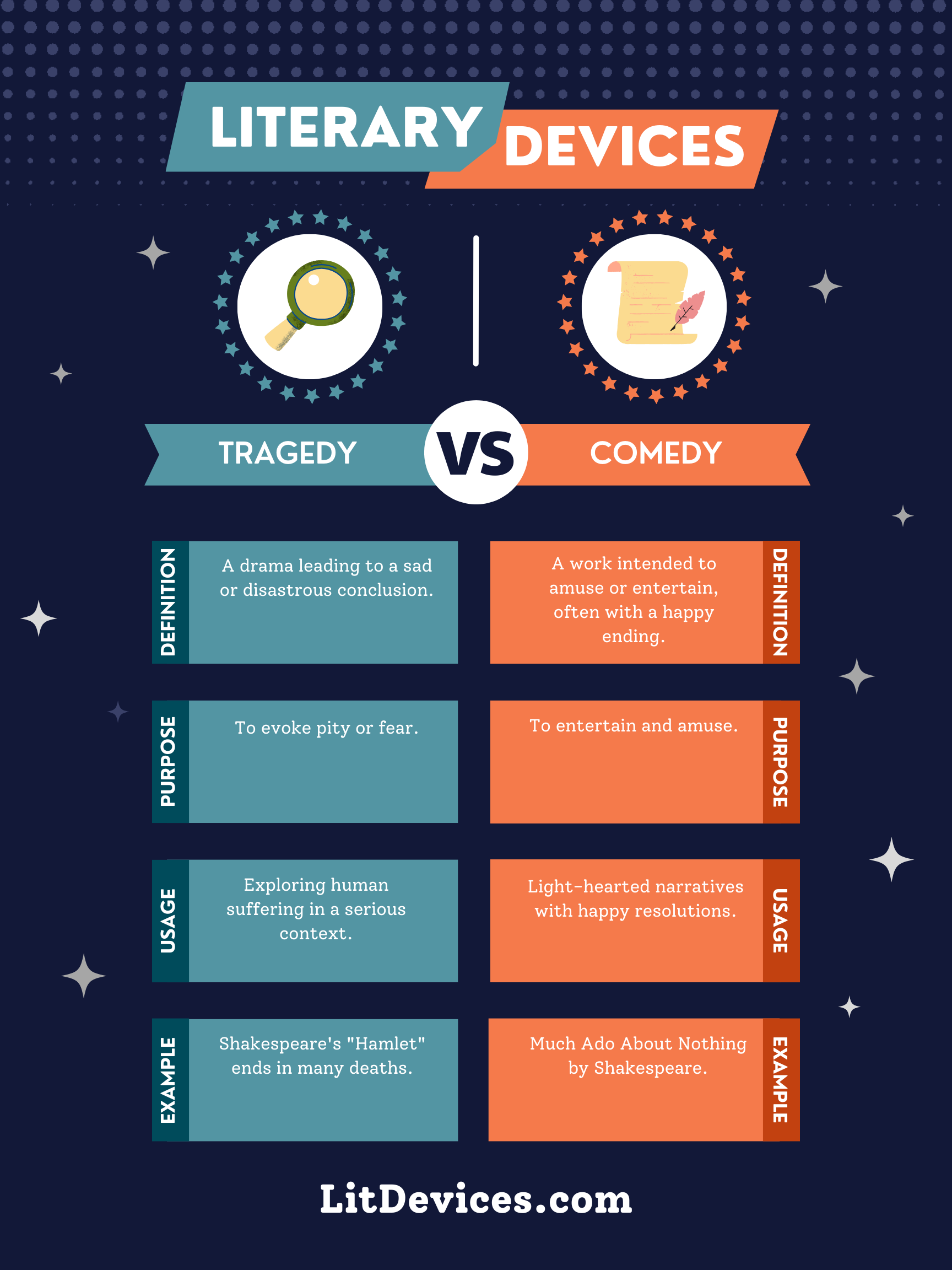Tragedy involves serious themes and ends in disaster for the protagonist; Comedy aims to entertain and usually ends happily.
Tragedy 🎭
Tragedy is a genre that delves into serious themes such as love, honor, betrayal, and morality. It often involves a noble hero’s downfall due to a tragic flaw or fate. For example, William Shakespeare’s “Hamlet” showcases the prince of Denmark’s struggle with revenge and morality, leading to a tragic end for him and those around him.
Comedy 😄
On the lighter side, Comedy focuses on humor to entertain its audience, often using exaggeration, irony, and satire. Plots typically revolve around misunderstandings, mistaken identities, or complex situations leading to humorous outcomes. A classic example is Shakespeare’s “A Midsummer Night’s Dream,” where the mix-up of lovers and the intervention of fairies create a comedic, enchanting story that ends happily.
Summary
| Literary Device | Tragedy | Comedy |
|---|---|---|
| Definition | A genre dealing with serious themes, leading to a disastrous end for the protagonist. | A genre intended to entertain and amuse, usually ending happily. |
| Purpose | To evoke pity and fear, leading to catharsis. | To entertain and provoke laughter, often highlighting human follies in a light-hearted way. |
| Usage | Focuses on noble characters facing downfall due to personal flaws or fate. | Involves situations of misunderstanding, mistaken identities, leading to humorous resolutions. |
| Examples | “Oedipus Rex” by Sophocles, “Hamlet” by Shakespeare. | “Twelfth Night” by Shakespeare, “The Importance of Being Earnest” by Oscar Wilde. |
Writing Tips for Tragedy or Comedy
For Tragedy Writers 🖋️
- Delve Deep: Explore profound themes and moral questions that challenge your characters and audience.
- Tragic Flaw: Develop a complex protagonist with a fatal flaw that leads to their downfall.
- Catharsis: Aim for an emotional purging in your audience, evoking pity and fear.
For Comedy Writers 😂
- Play with Misunderstandings: Utilize mistaken identities and misunderstandings to create humorous situations.
- Character Flaws: Exaggerate character flaws for comedic effect without making them unlikeable.
- Happy Endings: Ensure conflicts resolve in an uplifting or humorous way.
FAQs
What is the main emotional response each genre aims to evoke?
Tragedy aims to evoke pity and fear, leading to catharsis. In contrast, Comedy seeks to entertain and provoke laughter.
Can Tragedy and Comedy overlap?
Yes, elements of both genres can coexist in a single work, known as tragicomedy, aiming for a balance between the evocation of empathy and laughter.
How do the protagonists typically differ?
Tragedy often features a noble or high-status individual facing downfall, while Comedy may feature everyday characters in exaggerated situations.
Exercise: Tragedy vs. Comedy
Task: Identify if the following sentence is more characteristic of Tragedy or Comedy: “Despite his best efforts to secure the throne through clever tactics, his own mistrust and paranoia lead to his ultimate downfall.”
Answer: Tragedy
Interesting Device Comparisons
- Satire vs. Parody: Satire uses humor, irony, or exaggeration to critique society or individuals, while parody imitates a work or style to comedic effect.
- Dramatic Irony vs. Situational Irony: Dramatic irony occurs when the audience knows something the characters do not, leading to tension or humor. Situational irony involves a discrepancy between expected and actual outcomes.
- Foreshadowing vs. Red Herring: Foreshadowing hints at future events in a story, building anticipation or suspense. Red herrings are misleading clues that divert the audience’s attention, often used in mysteries.

